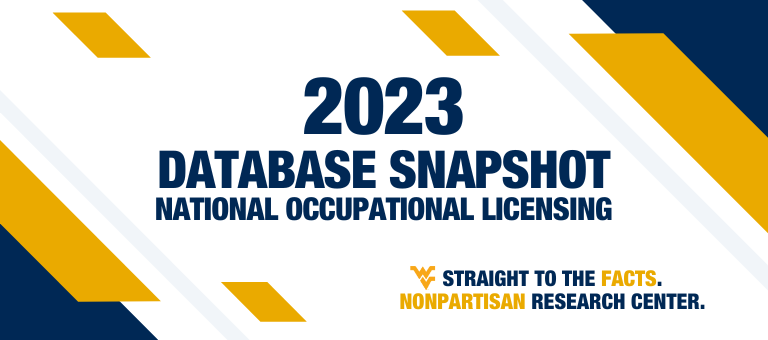
Nebraska Government, Military and Veterans Affairs Committee
February 15, 2023
Annual Licensing Database Snapshot: 2023
May 16, 2023Ohio Should Untangle Beauty Professionals from Unnecessary Regulation
Conor Norris
Assistant Director, Knee Center for the Study of Occupational Regulation, West Virginia University
Ohio Commerce and Labor Committee
March 28, 2023
Chair Johnson, Vice Chair Manchester, Ranking Member McNally, and all distinguished members of the Commerce and Labor Committee:
Thank you for allowing me to testify on the professional regulation of boutique beauty professionals in Ohio. I am the assistant director of the Knee Center for the Study of Occupational Regulation at West Virginia University. The main takeaways of my comments are the following:
- Licensing is not always the appropriate form of regulation.
- Licensing in Ohio reduces economic mobility and increases income inequality.
- Over 20 states have removed licensing requirements for one of the boutique beauty services included in HB 58.
Occupational licensing is one of the most common forms of professional regulation and the most stringent. These laws prevent Ohio residents from working in a profession until they meet certain entry requirements, which often include education, training, and passing exams. Licensing is designed to protect consumers from harm from low-skilled professionals, which is an important goal. However, licensing is not the only form of regulation that we can use to protect consumers.
Licensing can be costly, and we have to weigh both the costs and the benefits of these laws. Licensing laws create barriers to entry that make it more difficult to enter a profession. Economic research estimates that licensing reduces the number of professionals by up to 27 percent—showing that it can pose a serious roadblock to employment.[1]
Many professions that do not require a traditional, 4-year college degree do require a license. These professions offer an avenue to meaningful employment for non-college graduates if they can afford to meet the licensing requirements. Unfortunately, the time and money to meet training and education requirements prevent many from entering these professions. For those at the bottom of the socioeconomic ladder, this can effectively prevent them from working and making a better life for themselves. Research found that licensing laws in Ohio increased income inequality by over 5% and decreased economic mobility by over 2%—making achieving the American Dream that much more difficult.[2]
Boutique beauty services included in HB 85, which include eyelash extensions, blow drying and hairstyling, wig services, and weaving for natural hair styles, provide a good example of this problem. Economists consistently find evidence that licensing laws act as a barrier to entry for barbers and cosmetologists.[3] While licensing may be worthwhile to protect consumers from potential harms from these professions, boutique beauty services pose no such risk to consumers. Requiring a cosmetology or an esthetician license for these services imposes all of the costs of licensing with none of the benefits for consumers. These education programs cover far more information than is necessary, and some do not even teach the service being licensed.
Expanding the list of boutique beauty services and removing training and education requirements would open up opportunities for more Ohioans, helping them find meaningful work. Ohio’s current boutique services law makes the state a leader in this area. According to the Institute for Justice, 8 states have removed licensing requirements to provide at least one boutique beauty service in the past few years and several more are considering similar bills—following Ohio’s lead.[4]
Since removing the licensing requirement for boutique beauty services, states have not experienced a surge in consumer injuries. So far, we see no evidence of lower quality services or consumer harm resulting from delicensure and no consumer advocacy groups recommending reinstating licensing laws. No states have decided to relicense the practice since removing licensing.
Although licensing laws are designed to protect consumers from harm, they are not always appropriate. For boutique beauty services, consumers face little risk of injury or harm. However, both consumers and aspiring beauty professionals still face the full costs of licensing. Ohio has the opportunity to maintain their position as a national leader, removing unnecessary roadblocks to work as a boutique beauty professional.
[1] Peter Blair and Bobby Chung, “How Much of Barrier to Entry is Occupational Licensing?,” British Journal of Industrial Relations 57, no. 4 (2019): 919–43
[2] Timmons, Edward, Brian Meehan, Andrew Meehan, and John Hazenstab. “Assessing growth in occupational licensing of low-income occupations: 1993-2012.” Journal of Entrepreneurship and Public Policy 7, no. 2 (2018): 178-218.
[3] Adams, A. Frank, John D. Jackson, and Robert B. Ekelund. “Occupational licensing in a “competitive” labor market: The case of cosmetology.” Journal of Labor Research 23, no. 2 (2002): 261-278.; Timmons, Edward J., and Robert J. Thornton. “The Licensing of Barbers in the USA.” British Journal of Industrial Relations 48, no. 4 (2010): 740-757; Zapletal, Marek. “The effects of occupational licensing: evidence from business‐level data.” British Journal of Industrial Relations 57, no. 4 (2019): 894-918.; Timmons, Edward J., and Robert J. Thornton. “The Licensing of Barbers in the USA.” British Journal of Industrial Relations 48, no. 4 (2010): 740-757.
[4] Menjou, Mindy, Michael Bednarczuk, and Amy Hunter. “Beauty School Debt and Drop-Outs: How State Cosmetology Licensing Fails Aspiring Beauty Workers.” Institute for Justice (2021).



